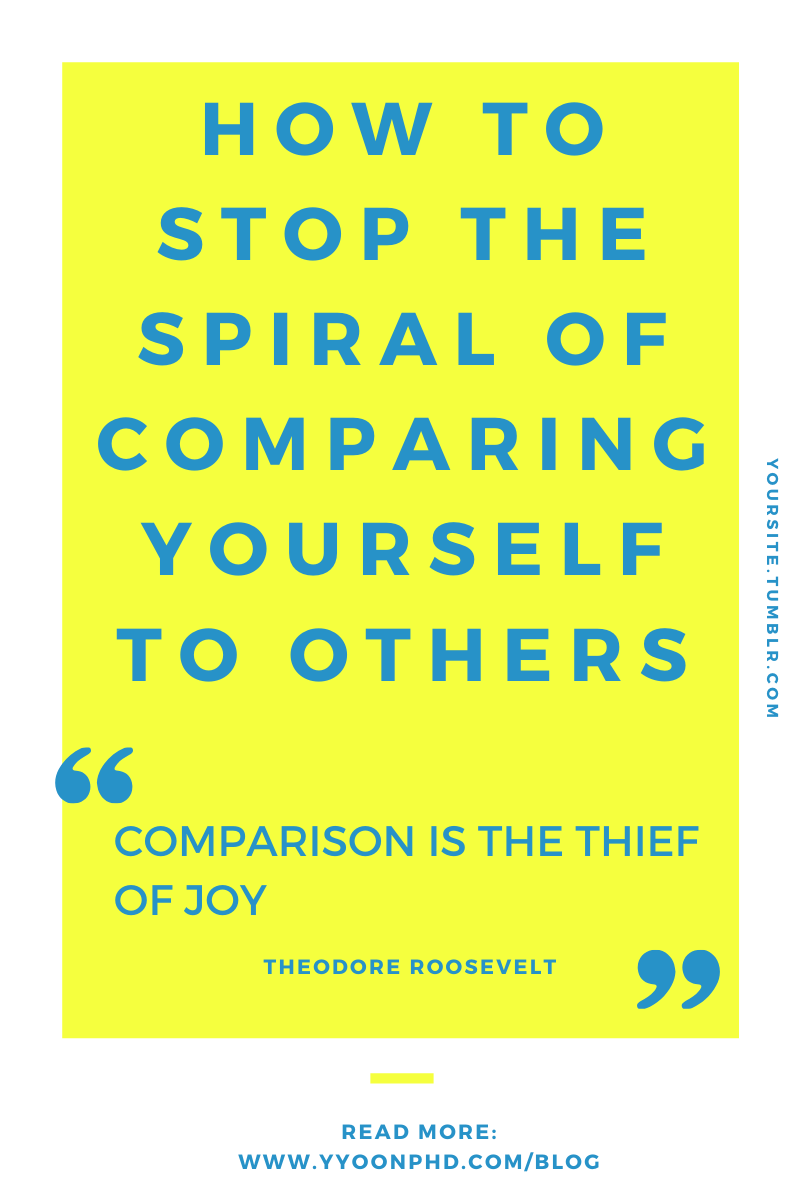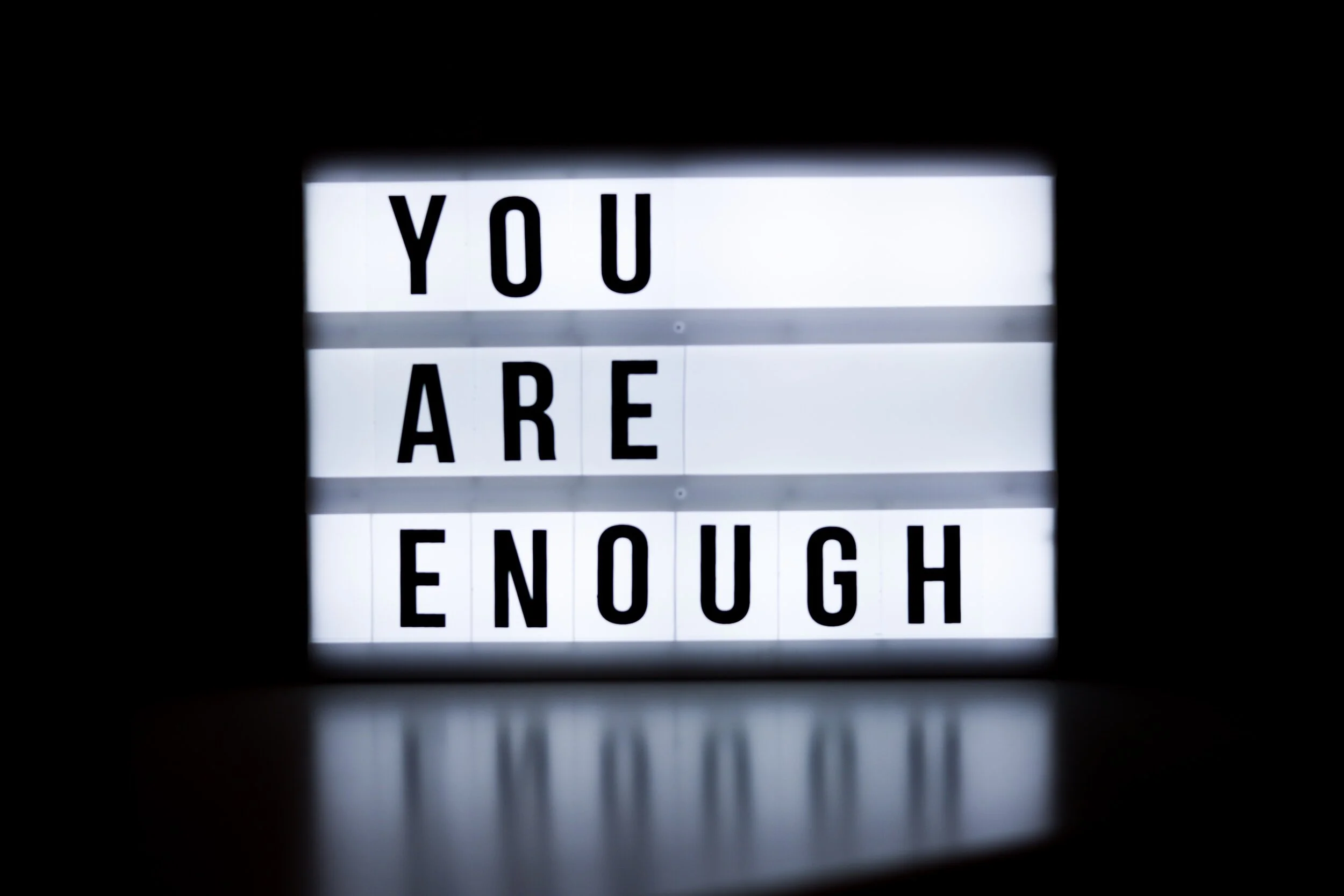“What do you think is the biggest waste of time?
Comparing yourself to others, said the mole.”
How often do you find yourself making comparisons to other people? Do you often have a thought that starts with or ends with some version of how someone else is better off than you in any number of ways?
“so-and-so is so much better, happier, more successful, more attractive....than me?”
It probably feels emotionally deflating to your confidence when you think these thoughts over and over again.
Why do we engage in making these constant comparisons with others even though we know it makes us feel so crappy?
Today I’ll talk about the impact making social comparisons can have on us and how to shift this common habit so you can feel better about who you are.
The history behind making social comparisons: Everyone’s doing it.
Take yourself off the hook here because you are certainly not alone. We’ve become used to comparing ourselves to others because of messages we have heard from a young age from family, friends, and teachers. Things like grades and other forms of evaluation have also built up a mindset of comparing ourselves to certain standards. From a young age up until now, we have gotten used to making judgments about ourselves. Those judgments are typically informed by how we’re stacking ourselves up against our peers. You don’t have to look far to see messages from society about how we should be better, more attractive, more successful, or more or less of something. We have also become more prone to the tendency to engage in social comparisons because of social media.
What are social comparisons?
Social comparisons help give us benchmarks for our own performance, behaviors, and attitudes. When we’re going through the world trying to make quick judgments and decisions, our brains look for information to help us make sense of our surroundings and inform how we feel.
There are broadly two types of social comparisons we tend to make:
Upward social comparisons: comparing ourselves with people we believe are better than us (e.g. Wow! That person has made so many more business deals this quarter!)
Downward social comparisons: comparing ourselves with people we believe are worse off than us (e.g. Well at least I’m doing better than that guy…)
Are there benefits to making social comparisons?
Yes…but I want you to take this lightly.
Social comparisons can be used as a source of motivation. But an important caveat is that it will only be helpful and motivating if you use these upward comparisons to help you get what truly matters. Here’s what I mean...
The Inspirational Role Model: An example of how social comparisons may potentially be helpful
Take a moment to think of someone who you deem is your role model. What makes them your role model?
Most likely this person has certain achievements, qualities and personal attributes that you admire. There is a power in seeing people we admire and looking up to the ways in which they’ve achieved something we want. When we have a model for what we would like to aspire to do or be, it can be motivating towards us bettering ourselves. For example, if you’re an aspiring marathoner and one of your role models is a marathon champion, then this person may motivate you to keep training, to utilize strategies this role model uses in their daily life, and to keep trying so you can achieve your goal of completing a marathon.
But there is a big difference between what is motivating or what makes us feel worse about ourselves and this depends on how closely (or not) our comparisons are based in reality or fantasy.
The trap of making social comparisons: Reality or fantasy?
I think what is often missing from the process of making social comparisons is the lack of understanding of the person or situation we’re comparing ourselves to. In other words, our minds are so quick to make those judgements about who is better or worse off than ourselves, but we’re not considering other key pieces of information that matter a lot. Your self-esteem and confidence is often impacted negatively when you’re basing your comparisons on false or very limited information.
Things you need to consider before falling prey to making automatic (and unfair) social comparisons
Remember you are your own person and they are their own person.
The next time you feel “inspired” by someone, take some time to learn about their story and what it took to be who they are and what they've achieved. This way you can have a fuller understanding of this person’s circumstances. Then remember that you have your own set of personal circumstances and you have things that are personally meaningful to you. Whatever is going on in someone else’s life may or may not be relevant to your personal circumstances.
There is more than what meets the eye.
Certain comparisons you’re making are not based in reality. Social media, advertising, curated stories and images are all notorious for taking a very specific lens at someone’s life and making us think it’s reality. We make judgments about ourselves based on these limited circumstances that aren’t usually real representations. So it’s a really unfair comparison, don’t you think?
“I wonder if there’s a school of unlearning?”
If you want to be more accepting of yourself and your life, there are helpful habits you can practice.
Turn a comparison into something that works for you
When you see someone or something you see as inspiring, be sure you are not using a “I should be…” mentality towards it. Take what you find to be aspirational and ask yourself if this is something you want and can do. Too often we fall into the trap of making comparisons as ways of saying what we “should” do.
If you’re motivated and inspired, make it personal and practical.
Take it a step further than just having a feeling of inspiration and break down what you want to achieve into something practical and personal for you. How can you take into consideration who you are and take what you find inspiring and turn it into something that doesn’t feel pie-in-the-sky? Make it into something that can be real for you, building off your strengths.
Spiraling when you start to make comparisons? Read more for ways to handle these harmful spiral of social comparisons
Ways to Prevent the Harmful Spiral of Social Comparisons
Awareness is key - Catch yourself before the spiral begins.
I don’t know if you’ve noticed that I pretty much always write that the first step to breaking any habit is awareness, right? (Read more here!). Notice when you’re engaging in the thought pattern. Notice the situations or people who are triggers to starting these social comparison spirals.
2. Replace the comparison with a quick check-in with yourself.
When you catch yourself thinking those “I should be…” or “I am better/worse than…” thoughts (and they will happen!), ask yourself:
Is this comparison actually going to help me be the best at what truly matters to me?
3. Remind yourself what you are grateful for now.
When we’re constantly comparing ourselves to others, it’s easy to lose sight of what we currently have in our lives and the things we love about ourselves. It’s powerful to stop and acknowledge a couple of things you feel grateful for (like your health and safety, a close relationship, your sense of humor, your ability to listen and have good friendships...just to name a few… :)
4. Avoid people and situations that are going to trigger social comparison spirals.
If you notice you get into this mindset of feeling worse about yourself after you’ve been on a social media platform, then consider taking a break from it. Maybe take a break from checking social media for a couple of hours, or even a day. See how this makes you feel.
5. Share the good news and seek support!
On a similar note - Surround yourself with people who are invested in breaking the habit of making comparisons. Share with them what new habits you’re building by not talking about how so and so is better off or worse off than you, or that you’re trying to cut back from social media, and see if you can support one another in this life-improving endeavor.
Conclusion
You can feel more centered and confident about who you are. There is a “school of unlearning” and you’ve got homework to do!
What kinds of comparisons are you quick to make? You can begin to break this habit of comparing yourself to others and feeling badly about it, with one important step: Acknowledge and notice it.
Until then, have a great week and don’t hesitate to be in touch.
Comment below or shoot me an e-mail with any questions or feedback!
References:
The Boy, The Mole, The Fox and The Horse by Charlie Mackesy
Learn more about Social Comparison Theory from writers at Psychology Today






